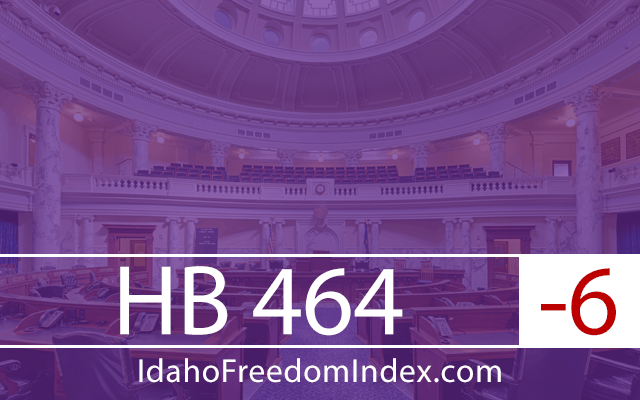


Bill description: HB 464 would grant the state Department of Health and Welfare the authority to request an 1115 waiver from the federal government. The Department of Insurance would also receive the authority to implement a 1332 waiver.
Rating: -6
Does it create, expand, or enlarge any agency, board, program, function, or activity of government? Conversely, does it eliminate or curtail the size or scope of government?
HB 464 would expand the scope of programs which the Department of Health and Welfare operates through the Section 1115 Waiver, which the bill authorizes. The waiver would allow the Department to expand Medicaid to a currently unserved group, people classified as having medically complex needs.
(-1)
This bill will expand the purview of the Department of Insurance under the Section 1332 Waiver. This waiver authorizes Idaho to extend the Advance Premium Tax Credit to a population that was not previously eligible for it.
(-1)
Does it transfer a function of the private sector to the government? Conversely, does it eliminate a function of government or return a function of government to the private sector?
The 1115 waivers as approved under this legislation would compel individuals with private health insurance to enroll in Medicaid. This would be done by forcing those who would qualify for Medicaid under the new provisions, to enroll in Medicaid or lose their Advanced Premium Tax Credits for the health insurance policies they currently purchase. The individuals would face the choice: enroll in Medicaid, or lose their federal subsidies and purchase insurance at the full market price. By penalizing these individuals with the loss of their Advanced Premium Tax Credit, most individuals would likely move out of the private, albeit subsidized, insurance market and onto government-run Medicaid.
(-1)
Does it increase government redistribution of wealth? Conversely, does it decrease government redistribution of wealth?
HB 464 would increase the number of Idahoans on Medicaid, offering a government benefit to a newly defined group of beneficiaries, people with Complex Medical Needs.
(-1)
Does it increase government spending (for objectionable purposes) or debt? Conversely, does it decrease government spending or debt?
The waivers that HB 464 would authorize would cost over $100 million in state and federal funds to cover the healthcare of increased numbers of individuals, and to handle the administration of these new programs.
(-1)
Does it violate the principles of federalism by increasing federal authority, yielding to federal blandishments, or incorporating changeable federal laws into Idaho statutes or rules? Conversely, does it restore or uphold the principles of federalism?
The dual waiver approach is uniquely bad as concerns the principles of federalism. The waivers are combined solely to satisfy a federal requirement for budget neutrality in their implementation. Stated plainly, Idaho seeks to push approximately 1,500 people or more onto Medicaid to lower the costs of the federal government’s Advanced Premium Tax Credit for the purpose of making thousands of other Idahoans eligible for the Advanced Premium Tax Credit. This is a blatant example of the danger of yielding to federal blandishments.
(-1)


